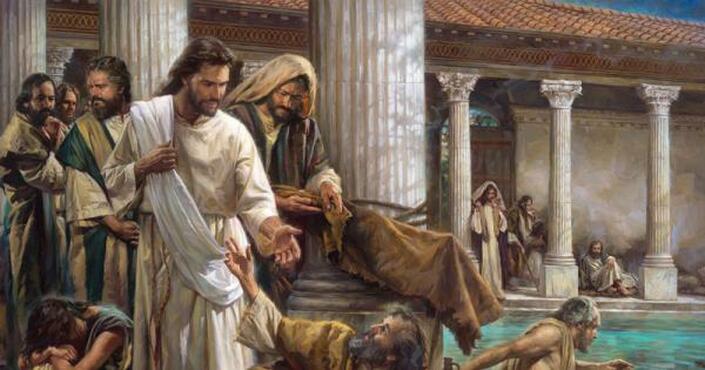|
John 5:1-16 (NRSVCE)
Yesterday we saw Jesus healing the royal official’s son, and we saw how that indicates that Christ meets us where we are and provides what we need in order to bring us to belief. Belief is the most important thing in John’s Gospel. Jesus stresses it over and over. So it makes sense that he would extend his hand and provide help to bring people to belief. But in today’s reading, we see something even more radical.
Jesus sees the sick man, waiting to enter the healing waters of the pool, and asks if he wishes to be healed. The man responds with what might be called a plea for help, as he clearly needs someone to bring him into the pool. Jesus does help him, but not in the way he expects. Jesus tells him to get up and walk, and immediately he is able to do so. But notice something here. At the end of John 4, Jesus healed the royal official’s son, and because of it the royal official and his entirely household believed. Now, at the start of John 5, Jesus heals someone else who is sick, and we hear nothing of belief. The man leaves. And not only does he leave, when he is confronted by the Jews, he doesn’t hesitate for a moment to point them in Jesus’ direction. “It’s not me you want, but that man!” He didn’t even know the name of the man who healed him. Not only was there no belief, there didn’t even seem to be gratitude. And see again that Jesus finds the man in the temple later. Jesus tells him to not sin anymore, so that nothing worse may happen. Jesus is referring, of course, to the greatest sin: unbelief. The man was healed, and did not believe. Jesus then tells him to believe, lest something worse befall him (i.e., death, which is what sin causes). The man immediately goes to turn Jesus in. Again, there is no belief, no gratitude. Unlike the royal official and his family, this man repeatedly sets himself up against Christ. He rejects Christ twice, without hesitation, even after being given the wondrous sign of miraculous healing. There’s a reason those two stories are placed next to each other. In the first, Jesus reaches out to those who need his help, and who he knows will come to belief if he does. In the second, Jesus knows he will be rejected, but he intervenes anyway. He knows they will not believe, even with these miraculous signs. But still he provides them. Jesus doesn’t just help those who already believe, like his disciples. He doesn’t just help those who have yet to come to believe. He helps even those who he knows will reject him, even knowing that he will be persecuted for it, as he was here. He helps indiscriminately. In every case, he doesn’t hesitate. “Go; your son will live.” “Stand up, take your mat and walk.” Christ’s blessings are for everyone. That’s the message we get from this story. Even when he knows it will incur the wrath of the authorities and people around him, even when he knows it will eventually mean a brutal death for himself, he continues to dole out his blessings. I find that incredibly encouraging. |
ArchivesCategories
All
|

 RSS Feed
RSS Feed